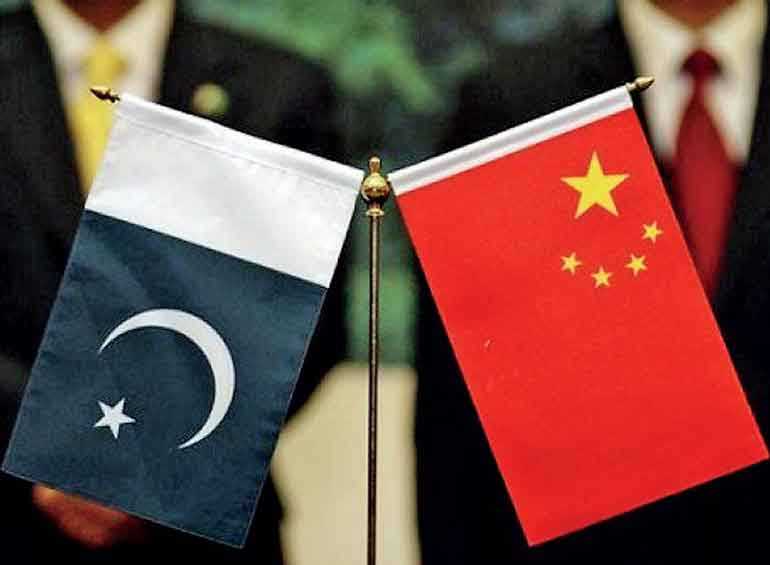Friday Feb 20, 2026
Friday Feb 20, 2026
Friday, 10 August 2018 00:10 - - {{hitsCtrl.values.hits}}

Says Beijing stepped forward to support development at a time when foreign investment had dried up - REUTERS
ISLAMABAD, AFP: Pakistan Wednesday defended its economic partnership with China, amid fears that the terms of opaque multi-billion dollar investments by Beijing could be exacerbating Islamabad’s economic woes as it considers a fresh IMF bailout.
“We have noted recent media reports questioning the viability of China Pakistan Economic Corridor (CPEC), claiming that it would create an unbearable debt burden for Pakistan,” the government said in a statement issued to the media.
“Such media reports are often one-sided, distort facts, and are based on irresponsible statements by individuals who either have no understanding of CPEC or are driven by ulterior motives,” the statement continued.
CPEC is an ambitious plan by Beijing to build infrastructure in Pakistan, mainly energy and transport, connecting the western Chinese region of Xinjiang with the Arabian Sea.
It is part of China’s massive “Belt and Road” initiative seeking to revive ancient trade routes through a massive rail and maritime network via $1 trillion in investments across Asia and Europe.
But the opaqueness of the CPEC terms has led to concerns as Pakistan faces a looming balance-of-payments crisis, with analysts saying it will need to take urgent action, potentially seeking a bailout from the International Monetary Fund (IMF).
“It is because of the favourable financing arrangements that Pakistan opted for Chinese investment under CPEC,” said the statement, issued under the caretaker administration currently running the country pending the formation of a new coalition government by election winner Imran Khan.
“China stepped forward to support Pakistan’s development at a time when foreign investment had dried up, and economic activity was being crippled by energy shortages and infrastructure gaps,” it said, calling CPEC a “win-win”.
Chinese energy companies have “raised funds from Chinese banks and investors”, and these do not constitute any debt obligation on Pakistan, the statement said.
“CPEC projects are financed through a composite financing package comprising long-term government-to-government concessional and preferential loans, as well as grants from the government of China. Repayments on these loans would not commence in the immediate future,” it added.
The details come after US Secretary of State Mike Pompeo voiced concerns in July over any IMF bailout being used to repay Islamabad’s debts to China, with whom Washington is engaged in a trade war.
On Tuesday Pakistan’s likely future finance minister Asad Umar announced that the decision on a possible IMF loan would be taken by “the end of September”.
“There is a general perception that we have picked up very expensive loans from the Chinese. I personally don’t think so,” he told reporters in Islamabad.
“They are like most commercial loans,” he said, denouncing the “lack of transparency” by the previous government on the subject.
China’s financial largesse, in the form of the Belt and Road project, has raised concerns over the vulnerability of poorer nations to such massive debt.
Last year Sri Lanka was forced to hand over majority control of its Hambantota port to China after being unable to repay its loans.
Pakistan’s Imran Khan calls for more ‘trustworthy’ ties with US
 ISLAMABAD (Reuters): Pakistani prime minister-in-waiting Imran Khan called for more “trustworthy” ties with the United States which have frayed amid US accusations that Pakistan is aiding Islamist insurgents waging war in Afghanistan, something Islamabad denies.
ISLAMABAD (Reuters): Pakistani prime minister-in-waiting Imran Khan called for more “trustworthy” ties with the United States which have frayed amid US accusations that Pakistan is aiding Islamist insurgents waging war in Afghanistan, something Islamabad denies.
Khan, who is due to be sworn-in as premier next week after his July 25 election victory, met acting US Ambassador to Pakistan John F. Hoover on Wednesday and said the ups and downs in relations had led to a “trust deficit”.
Washington has suspended aid and military assistance to Pakistan.
“(My party) wants to build a relationship with United States based on trust and mutual respect and hence our government will engage with US to make this relationship more balanced and trustworthy,” Khan’s Pakistan Tehreek-e-Insaf (PTI) party said in a statement late on Wednesday, attributing comments to Khan.
Khan added that there was a need to “transform” the diplomatic ties between the two countries. The US Embassy in Pakistan has not commented on the meeting.
In January, US President Donald Trump further strained relations with a withering attack on Pakistan on Twitter, accusing Pakistan of playing a “double game” on fighting terrorism and vowing a tougher approach.
In the same tweet he said the United States has been rewarded with “nothing but lies and deceit” for “foolishly” giving Pakistan more than $33 billion in aid in the past 15 years.
Last week, the United States angered Islamabad by raising the prospect of opposing any future International Monetary Fund (IMF) bailout for Pakistan, which its economy badly needs, due to concerns the money would go towards paying off Chinese loans.
The United States is wary of the closer ties between Pakistan and China, which have deepened in recent years on the back of Beijing’s pledge to fund $57 billion in infrastructure as part of its vast Belt and Road initiative.
Khan’s party said the former cricketer also discussed Afghanistan with the US envoy, stressing that a political solution was needed rather than more fighting.
“Stability in Afghanistan, he said, is (in) the larger interests of Pakistan, America and the region and hence should be earned through viable political engagements,” said Khan, according to the PTI statement.